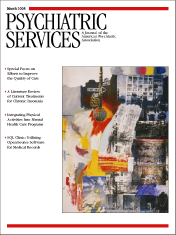Structured Exercise for Persons With Serious Psychiatric Disabilities
Many people with serious mental illness live with the dual challenge of a psychiatric illness and a serious medical condition, such as diabetes, obesity, or hypertension. However, many rehabilitation programs focus on managing mental illness rather than providing comprehensive interventions that promote functional health.
A study funded by the National Institute on Disability and Rehabilitation Research conducted at the Center for Psychiatric Rehabilitation at Boston University investigated the feasibility and efficacy of a supported, structured exercise program as an adjunct to treatment and rehabilitation for persons with serious psychiatric disabilities. The intervention consisted of three supervised, 45-minute exercise sessions each week for 20 weeks. Before the program began, participants underwent a comprehensive medical examination with a cardiologist and participated in an exercise tolerance test to determine individualized target heart rates for exercise. The exercise sessions were conducted in a university fitness room, and participants chose from stationary bicycles, stair-climbing machines, and treadmills. Participants were taught to monitor their heart rates, and they exercised within a predetermined target heart range. They progressed to 30 minutes of cardiovascular exercise with defined warm-up and cool-down periods.
Instructors included two graduate students in exercise science and two master's-level rehabilitation counselors. The staff provided instruction on assessing heart rates, using proper warm-up and cool-down techniques, exercising within target heart rates, and using the exercise equipment correctly. Instructors collaborated with participants to set individualized fitness goals and create wellness plans. They monitored exercise intensity and duration and provided support for participation.
The findings from a 40-week program evaluation indicated that structured physical activity programs are feasible, wanted, and needed by persons with serious mental illness. The evaluation assessed physiological and psychosocial variables at baseline, ten weeks, and 20 weeks. Forty-six individuals began the program, and 37 (16 women and 21 men; mean age 32 years) completed it. They attended an average of 40 of the 60 sessions (66 percent). During the exercise phase, participants showed statistically significant improvements in their cardiovascular fitness, as assessed by the exercise tolerance test, and in the psychological constructs of self-esteem, quality of life, mood, and depression.
Editors' Note: An article in this month's issue by Caroline R. Richardson, M.D., and her colleagues (see page 324) reviews evidence supporting the need for interventions to promote physical activity among persons with serious mental illness. Described here are four such interventions for changing sedentary habits that have been welcomed by participants.
The successful intervention identified the need for a range of wellness interventions to meet people's readiness to change their lifestyle habits. The structured exercise program was the catalyst for the development of the Recovery Center, an innovative program within the Center for Psychiatric Rehabilitation at Boston University that was started in 2000.
The Recovery Center (www.bu.edu/cpr/rc) uses an adult education model to offer people with serious mental illness educational opportunities to strengthen and broaden their skills in physical, intellectual, emotional, and spiritual practices that may support their treatment, rehabilitation, and recovery efforts. Currently, 150 participants, referred to as students, work with a recovery advisor to choose from courses that raise awareness, teach information and skills, and develop support and coping strategies for the implementation of health promotion practices in daily life.
Courses meet weekly for two hours and are offered on a trimester basis. Class sizes range from 12 to 20 students. The program cost is estimated at $400 per course, but most participants receive full scholarships. Scholarship money is donated by private individuals, foundations, and corporations. Physical health-related courses include tai-chi, chi gung, nutrition, conscious eating, developing stress hardiness, health literacy and advocacy, sexuality and intimacy, supported fitness, yoga, meditation, healthy lifestyle education, and reiki.
Courses are team taught by both individuals in recovery and professionals from the fields of social work, occupational therapy, medicine, exercise science, mental health, theology, and technology. Fourteen of the 26 staff are consumers of mental health services. There are five full-time staff. All instructors receive training and supervision in skill teaching and support of persons with mental illness in an educational setting. Instructors develop content outlines, syllabi, and curricula for their courses. Since 2000, more than 400 students have taken courses at the Recovery Center.
Dr. Hutchinson is director of services at the Center for Psychiatric Rehabilitation at Boston University, 940 Commonwealth Avenue West, Boston, Massachusetts 02215 ([email protected]).



